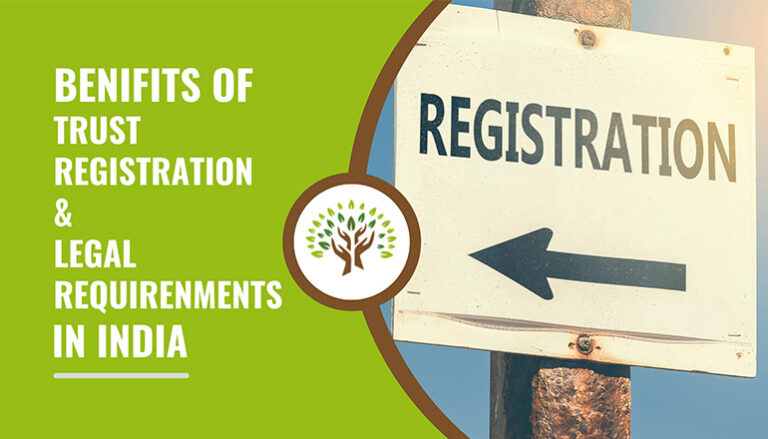Trust
Sakshi
Feb 26

Establishing a trust is a significant step for individuals and organizations aiming to contribute to societal welfare, manage assets, or pursue philanthropic objectives. In India, registering a trust not only provides a structured framework for its operations but also unlocks various legal and financial benefits. This article delves into the key benefits of trust registration and outlines the essential legal requirements in India.
1. Legal Recognition
Registering a trust grants it a distinct legal identity separate from its founders and trustees. This legal recognition ensures that the trust can own property, enter into contracts, sue, and be sued in its own name. It provides a formal structure that legitimizes the trust’s existence and operations.
2. Tax Benefits (12A & 80G Registration)
One of the most compelling benefits of trust registration is access to significant tax advantages. By obtaining 12A and 80G certifications under the Income Tax Act, trusts can enjoy:
These certifications enhance the trust’s financial sustainability by reducing its tax liabilities and increasing donor confidence.
3. Perpetual Succession
A registered trust enjoys perpetual succession, meaning its existence is not affected by changes in trustees or the death of its members. This continuity ensures that the trust can pursue its objectives without interruption, providing long-term stability and reliability.
4. Enhanced Credibility and Trustworthiness
Formal registration boosts the trust’s credibility among stakeholders, including donors, beneficiaries, government bodies, and the general public. It signifies that the trust adheres to legal standards and operates transparently, fostering trust and encouraging greater support and collaboration.
5. Access to Funding and Grants
Registered trusts are often eligible for various government grants, subsidies, and funding opportunities from international organizations. Many philanthropic foundations and corporate social responsibility (CSR) initiatives prefer or require formal registration before providing financial support, making registration crucial for expanding the trust’s funding sources.
6. Limited Liability
In a registered trust, the trustees have limited liability concerning the trust’s obligations. Their personal assets are generally protected from claims against the trust, provided they act in good faith and within the scope of their authority. This protection encourages competent individuals to serve as trustees without fear of personal financial risk.
7. Ownership of Property
A registered trust can own, buy, sell, and lease property in its own name. This ability to manage real estate independently is vital for trusts involved in activities like education, healthcare, and social services, which often require substantial physical infrastructure.
Registering a trust in India involves adhering to specific legal requirements designed to ensure transparency, accountability, and proper governance. Here are the essential steps and criteria:
1. Name of the Trust
The trust must have a unique name that reflects its purpose and objectives. The name should not infringe on existing trademarks or registered names of other organizations. It’s advisable to choose a meaningful and memorable name that resonates with the trust’s mission.
2. Trust Deed
A trust deed is a foundational document outlining the trust’s objectives, governance structure, roles and responsibilities of trustees, rules for managing assets, and procedures for meetings and decision-making. The deed must include:
3. Trustees
A minimum of two trustees is required to register a trust in India, though some states may require more. Trustees should be individuals of good character and integrity, committed to the trust’s objectives. Their roles include managing the trust’s assets, ensuring compliance with legal requirements, and making strategic decisions to advance the trust’s mission.
4. Objectives of the Trust
The trust must clearly define its objectives, ensuring they fall under charitable purposes as recognized by Indian law. Common objectives include education, healthcare, poverty alleviation, environmental conservation, and social welfare. Clear objectives help in the smooth operation and governance of the trust.
5. Registration Process
The process of registering a trust involves several steps:
6. Compliance Requirements
Once registered, a trust must adhere to ongoing compliance requirements to maintain its legal status and tax benefits:
Registering a trust in India offers numerous benefits, from legal recognition and tax advantages to enhanced credibility and access to funding. These benefits not only facilitate the smooth operation of the trust but also amplify its impact on society. However, the registration process involves meticulous adherence to legal requirements, including drafting a comprehensive trust deed, appointing trustworthy trustees, and maintaining ongoing compliance. By fulfilling these obligations, individuals and organizations can establish a robust and effective trust that stands the test of time, driving meaningful change and contributing to the greater good.
Q1: What is the difference between a revocable and irrevocable trust?
Ans1: A revocable trust can be modified or revoked by the trust creator during their lifetime, whereas an irrevocable trust cannot be easily modified or revoked once established. Both types of trusts have different benefits and considerations regarding asset protection, taxation, and control.
Q2: Do I need a lawyer to register a trust?
Ans2: While it is not a legal requirement to have a lawyer, seeking legal advice when registering a trust is highly recommended. A lawyer specializing in trust law can guide you through the legal requirements, help draft the necessary documents, and ensure your trust is properly structured to meet your needs.
Q3: Can I be the trustee of my trust?
Ans3: Yes, in many cases, you can be the initial trustee of your trust. However, it is important to have a successor trustee named in the trust document who can take over the management and distribution of trust assets in case of your incapacity or passing.
Q4: How long does the trust registration process take?
A4: The duration of the registration trust process, the complexity of the trust, the jurisdiction’s requirements, and any specific circumstances involved. It is advisable to consult with a legal professional who can provide a more accurate estimate based on your specific situation.
Q5: What happens if I don’t register my trust?
A5: Please register a trust to avoid legal and administrative complications. With proper registration, the trust may be recognized as a separate legal entity, potentially nullifying the intended benefits and protections of the trust structure. It is crucial to complete the registration process to ensure the validity and enforceability of the trust.
Referring website-thenationaltrust.gov.in

I am a dedicated and detail-oriented Website Content Writer with over two years of experience in creating compelling, reader-friendly, and SEO-optimized content. My expertise lies in developing well-structured web pages, landing pages, blogs, and service descriptions that enhance user engagement and drive organic traffic.